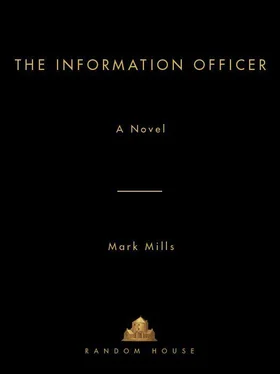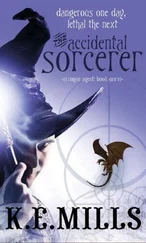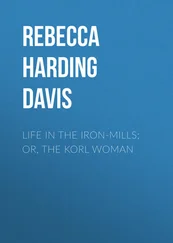Mark Mills - The Information Officer
Здесь есть возможность читать онлайн «Mark Mills - The Information Officer» — ознакомительный отрывок электронной книги совершенно бесплатно, а после прочтения отрывка купить полную версию. В некоторых случаях можно слушать аудио, скачать через торрент в формате fb2 и присутствует краткое содержание. Жанр: Старинная литература, на русском языке. Описание произведения, (предисловие) а так же отзывы посетителей доступны на портале библиотеки ЛибКат.
- Название:The Information Officer
- Автор:
- Жанр:
- Год:неизвестен
- ISBN:нет данных
- Рейтинг книги:5 / 5. Голосов: 1
-
Избранное:Добавить в избранное
- Отзывы:
-
Ваша оценка:
- 100
- 1
- 2
- 3
- 4
- 5
The Information Officer: краткое содержание, описание и аннотация
Предлагаем к чтению аннотацию, описание, краткое содержание или предисловие (зависит от того, что написал сам автор книги «The Information Officer»). Если вы не нашли необходимую информацию о книге — напишите в комментариях, мы постараемся отыскать её.
The Information Officer — читать онлайн ознакомительный отрывок
Ниже представлен текст книги, разбитый по страницам. Система сохранения места последней прочитанной страницы, позволяет с удобством читать онлайн бесплатно книгу «The Information Officer», без необходимости каждый раз заново искать на чём Вы остановились. Поставьте закладку, и сможете в любой момент перейти на страницу, на которой закончили чтение.
Интервал:
Закладка:
To the west lay the Dingli Cliffs, mile upon mile of sheer limestone rock face rising two hundred feet from the water. The Dingli Cliffs were home to another kind of temple, one that celebrated the new technology, for it was there that the island’s primary radio direction finding station was located. In between, though, lay a stretch of coast Max hadn’t even known existed. There seemed to be only one dirt track in and out, and without Elliot’s directions he would hardly have noticed the junction.
The track elbowed its way up a hillside of stunted trees and rock-strewn fields. It then dipped away sharply toward the cliffs, before veering to the right and hugging the coastline. To his left the ground descended in narrow cultivated terraces until the slope became too steep to hold them. On his right rose a rocky escarpment. True to form, the Maltese had responded by pouncing on this meagre scrap that nature had tossed them, this precarious step of land at the edge of the world. Judging from the age of the few farmhouses he passed, people had been there for centuries, scratching a living from the powdery soil.
He was on the point of turning back when he saw the isolated chapel with the faded blue doors that Elliott had mentioned. A few hundred yards farther on he came across the sorry-looking cypress where the track bifurcated. The lower route petered out at a cluster of whitewashed farm buildings arranged around an open courtyard and towered over by two Aleppo pines. It was just as Elliott had described it, although he hadn’t mentioned the short wireless mast on the roof of the farmhouse.
Beyond the compound, the ground fell away in stone-trimmed terraces toward the cliff edge, and it was here that Max saw a tall figure silhouetted against the lowering sun. Elliott appeared to be scything grass, but as Max drew closer, it became clear that he was swinging a golf club.
Max propped the motorcycle against one of the pines and made his way over.
“Do you play?” asked Elliott.
“Badly.”
“Then you’re in excellent company.”
The tin pail at Elliott’s feet was brimming with golf balls.
“From the Marsa Golf Club,” he explained. “They’ve got no use for them anymore.” Not since the club’s fairways and greens had been plowed up and turned into allotments.
“There’s a whole load more in the barn, so don’t hold back,” he added, making for the farmhouse. He returned a little while later with the promised bottle of white burgundy, two wineglasses, and a Maltese man carrying a folding side table.
“Pawlu helps me out from time to time.”
Pawlu was the sort of fellow you’d want on your side in a fight—not tall, but thickset and bull-necked. When they shook hands, Max’s felt like a child’s in a bear’s paw.
“I am pleased to meet you.”
“Pawlu speaks good English. He used to work down at the docks as a stevedore but now has a farm up on the ridge there, as well as a beautiful wife and two young sons who make a good living picking up the golf balls that don’t go over the cliff.”
“Which is most of them.”
“He’s also extremely insolent, and I’m thinking of dispensing with his services.”
Pawlu gave a disarmingly warm smile, then excused himself. He was expected home for dinner.
Max and Elliott spent the next half hour quaffing the excellent wine and driving golf balls out to sea, toward the setting sun. Anything clearing the cliff (which required a perfectly struck three iron) scored one point; anything less scored no points, even if the ball bounced over the edge. Elliott liked to play dirty: “You’re forcing it with your shoulders” … “Stop lifting your head” … “Let the club do the work” … “You’re getting a bit wristy, must be the wine”—irritating observations intended to throw Max off his game.
They were level at a far-from-impressive four points apiece when the contest was brought to a halt by the building roar of an aircraft engine.
“Here,” said Elliott, thrusting a seven iron into Max’s hand. “You’re going to need more loft.”
“What?”
“On my word, okay?”
They both set themselves, ready to swing.
Max saw them now: four fighters coming at them from the west in wide line abreast, hugging the cliff top. They were enemy aircraft, new Me109Fs with their distinctive yellow noses.
“Now!”
They swung their clubs in unison. In his eagerness, Max topped his ball, but Elliott’s sailed high into the air with just the right amount of lead on it. For a moment it seemed that the impossible was about to be achieved, and if the ball had carried another fifty yards or so, it might well have been.
The four fighters thundered past unscathed. It was probably just a trick of the light, but Max could have sworn that he saw one of the pilots wave.
“He waved,” said Max. “One of them waved.”
“That’s because they know me.”
They were regulars, apparently, marauders who often appeared at this hour.
“They turn inland just down from here, coming at Safi and Luqa out of the low sun. Didn’t think they’d show today, though—nothing else has.”
The remote crackle of light antiaircraft fire carried up the coast to their ears.
“There they go. First action of the day.”
It also proved to be the last. By eight o’clock, there was still no sign of any bombers, and the last slither of the sun was sinking into the sea.
The warm orange light suffusing the courtyard gave way by almost imperceptible degrees to the distinctive purples and blues of a Maltese twilight. Elliott had got a fire going in an upturned dustbin lid that served as his barbecue, and a second bottle of Burgundy had appeared from the cellar. He had another white wine in mind for when the fish hit the table.
There were two of them, big and fresh and in need of gutting.
“Pawlu gets them for me.”
“I thought the fishermen had stopped going out.”
There had been a number of fatal strafing attacks on fishing boats in the last month—all part of the new policy of deliberately targeting the locals.
“These two beauties would suggest otherwise,” Elliott said, grinning.
He sat himself down across from Max at the rough lumber table in the courtyard and began to prepare the fish, working the knife with an expert hand.
“You look like you know what you’re doing.”
“Don’t be fooled. Pawlu showed me how.” He glanced up at Max. “It’s not in my blood, if that’s what you’re asking. I’m from mountain stock.”
It was near enough the first information Elliott had ever volunteered about himself, and it didn’t stop there.
He had grown up in the Berkshire Hills in western Massachusetts. Writers such as Nathaniel Hawthorne and Herman Melville had lived there and waxed lyrical about its stubborn and stony beauty, its soaring peaks and plunging valleys, but such romantic considerations had probably not figured very large in the minds of Elliott’s forebears on his mother’s side when they had chopped their farm out of the wilderness.
Winters there were long and harsh. Elliott could remember milk freezing in a pail left by an open door, and his mother thawing out the buttonholes on his jacket with a hot flatiron. He could also recall his grandfather getting caught in a blizzard and being carried home in the back of a cart, closer to death than life, not long for the world.
Elliott had been twelve at the time, and when it had finally been his turn to say his farewells, he had gone upstairs to the bed where his grandfather lay. Drawing him close by the hand, the old man had whispered weakly into his ear: “It is appointed unto man once to die.”
“I can tell you,” Elliott went on, “I was pretty glum when I woke the next morning. And you know what? The first thing I saw when I went down to breakfast was that hard-shelled old bastard moaning to my grandma that she’d overcooked the bacon again.”
Читать дальшеИнтервал:
Закладка:
Похожие книги на «The Information Officer»
Представляем Вашему вниманию похожие книги на «The Information Officer» списком для выбора. Мы отобрали схожую по названию и смыслу литературу в надежде предоставить читателям больше вариантов отыскать новые, интересные, ещё непрочитанные произведения.
Обсуждение, отзывы о книге «The Information Officer» и просто собственные мнения читателей. Оставьте ваши комментарии, напишите, что Вы думаете о произведении, его смысле или главных героях. Укажите что конкретно понравилось, а что нет, и почему Вы так считаете.










